With the highest admission standards in Canada, McGill attracts many of the brightest students in the country and from around the world. Being entrusted to guide these exceptional students is a huge responsibility, which is why the Principal’s Prize for Excellence in Teaching was established in 2000 to celebrate teachers.
“McGill is a research-intensive university, but we are also student-centered and these prizes recognize the important contributions that individuals make by bringing their research to students and having their students learn from these experiences,” Provost Anthony C. Masi said at the Oct. 29 Convocation ceremonies. “These prizes celebrate those among us who are exceptional in the demonstration of the qualities of outstanding pedagogical practice. The winners honoured here today embody the best in teaching, supervising, advising and mentoring.”
As is the case every year, the award is presented to one recipient in each of four categories: Faculty Lecturer, Assistant Professor, Associate Professor and Full Professor.
Faculty of Management Professor Henry Mintzberg was also honoured when he became only the fifth person to be presented with the McGill University Lifetime Achievement Award for Leadership in Learning.
Henry Mintzberg: Pushing the envelope for more than 45 years
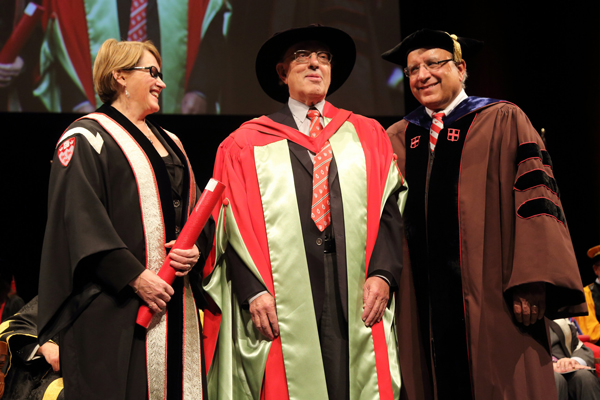
“Professor Henry Mintzberg, is one of the most influential thinkers in the area of management and business strategy,” Morty Yalovsky, Interim Dean of the Desautels Faculty of Management, told the audience. “He is recognized for challenging conventional perspectives and pushing the boundaries of management.”
Mintzberg (BEng’61) has been pushing boundaries since joining the University as a professor of Strategy and Organization in 1968. The John E. Cleghorn Distinguished Teaching and Research Chair in Management Studies has dedicated much of his career to developing new approaches to management education.
The International Masters in Practicing Management program, which he co-founded in 1996, was the first embodiment of this approach. In 2006, Mintzberg launched the ambitious International Masters for Health Leadership program in collaboration with the Faculty of Medicine, for professionals from around the world working in health-care management. Two years later, he helped establish the McGill-HEC Executive MBA program, one of the world’s first truly bilingual executive programs.
Despite being at the vanguard of new approaches to teaching and managing, however, Mintzberg says some constants should remain untouched. “Since I came back to teach at McGill in 1968, I’ve seen a lot of universities change drastically – and not always for the best,” he says. “While McGill has evolved over time, it hasn’t undergone huge changes – and that’s to its credit. It still remains the incredibly serious and scholarly place it always has been.”
Mintzberg says one of the keys to success for teachers is to be open to new ideas, no matter what, or who, might be their source.
“It is absolutely essential to have sufficient respect for your class to recognize that these students are just as capable of having excellent ideas as we as faculty do,” he says. “We love to hear our own voices but it’s just as important to listen.”
Nancy Mayo: Stats, glorious stats
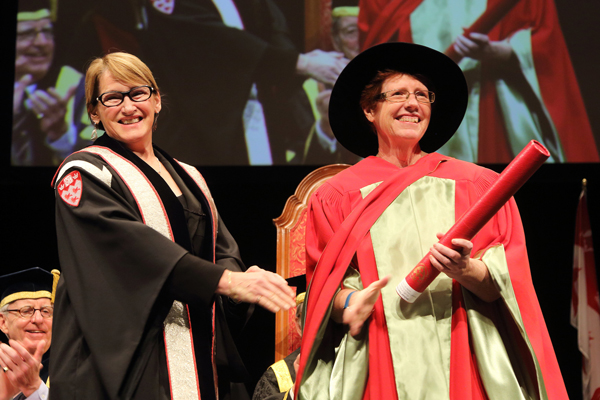
When Nancy Mayo is asked how she can take a “really boring subject’ [her words] like research methodology and application of statistics to clinical data and make it capture the attention of students, she laughs.
“I guess that’s why I won a prize,” says Mayo, a member of the Faculty of Medicine and the winner of the Principal’s Prize for Excellence in Teaching in the Full Professor category. “You have to work extremely hard to take something that is extraordinarily boring and make it interesting.”
One of the keys is to engage students early in the semester, which is why, by the second class, they are already presenting on articles of their own choosing in their field of interest. “You want to have them create their own learning materials so that it’s not just some big head up front telling them what to do.”
A trained clinician and physical therapist, Mayo, turned to academics because she wanted to do research. But she found she was equally impassioned about working with the future leaders in the field. “I like teaching but more to the point I really want to train the next generation of clinicians to deal with Canada’s health-care problems,” she says. “I want people to be better prepared to deal with our emerging epidemics and to better manage our health-care crises. So teaching really is a means to an end.”
Colin Chalk: Lessons learned, lessons passed on again
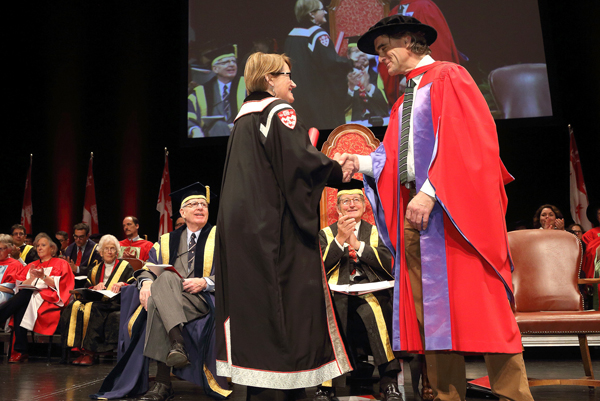
In his first year as a medical student at McGill in 1979, Colin Chalk remembers two professors who would have a profound impact on his later career.
“One was Yves Clermont [Professor of Anatomy and Cell Biology], who recently died. He was legendary for his elegance and his passion,” says Chalk, this year’s winner in the Associate Professor category. “I can still remember those cold winter mornings in the Strathcona Amphitheatre with him making these marvelous drawings on the blackboard in coloured chalk and describing the intricacies of how cells work. It was just a fantastic thing to watch.
“The other was Peter McLeod [Professor of Medicine and Pharmacology], who is just about to retire,” says Chalk. “At the time, Peter was an internist who taught pharmacology (and still does). He was particularly good at distilling things down to their essential points in a way that was memorable.”
Chalk says he recalls these professors when dealing with the challenges of teaching today’s students. “There is so much information that students easily get overwhelmed. So to I try and distill the vast universe of information down to the really salient points,” he says. “It’s not just a question of transferring information it’s also how we translate transfer it.”
Gary Brouhard: Helping students fill the gaps in their knowledge
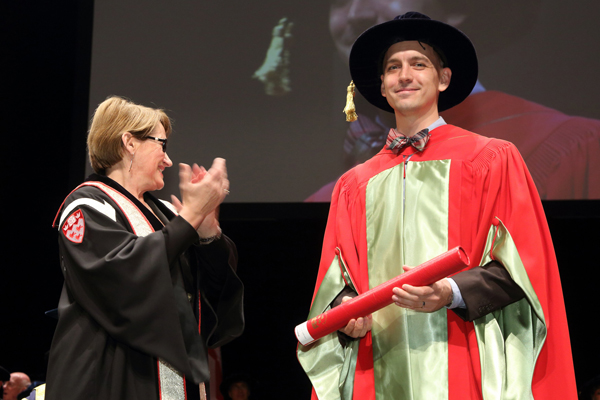
For Gary Brouhard, getting the prize in the Assistant Professor category was a nice change of pace. “In Science you have to deal with your share of negative criticism. You submit grants for review and they get rejected and you submit papers for review and they come back with all these withering criticisms,” he says. “In this line of work, it’s good to have thick skin.
“Teaching is nice because it’s an area where I work hard and, in general, people say ‘Good job.’ ”
Rather than just spoon-feeding information to students and then testing them on what they know, Brouhard likes to turn the tables and get them to think about what they don’t know.
“At the end the semester for one of my classes, students submit a proper grant application, as if they were going to apply to NSERC for funding. They propose new experiments on the topic they choose,” he says. “A lot of undergraduates find that very challenging because they are rarely asked to think about what kind knowledge we don’t have and that they would want to obtain if they could. I want them to think about the gaps in our knowledge and how they would go about filling them.”
Eyad Hashem Atallah: Science with storylines
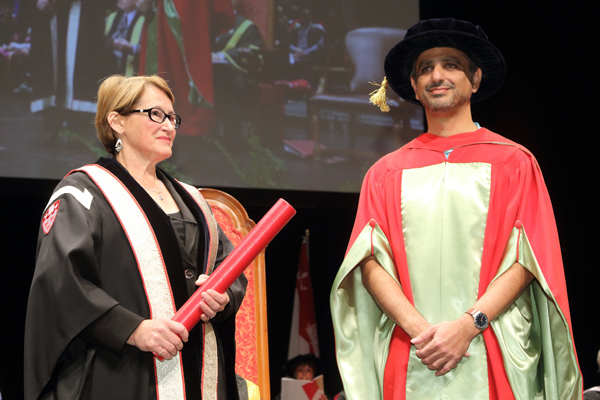
In Eyad Hashem Atallah’s view, one of the greatest failings in Science education is not enough cowbell.
“When you are educating people you can’t lose sight of the idea that if you want to keep people interested you have to somehow entertain them. Maybe not in the strictest sense of the word but you have to keep them engaged,” says the winner of the Faculty Lecturer category. “The best profs I had turned every lesson into a story, with a theme, a moral, a beginning and an end. I try to do the same thing.
“It may be an overgeneralization but I think the problem we have as teachers is that we’re trying to convey so much information to people and we basically just start listing facts or concepts. It just becomes this clinical recitation,” says Atallah, from the Department of Atmospheric and Oceanic Studies. “That’s when you lose students.”
To see which employees won this year’s Principal’s Awards for Administrative and Support Staff, go here.
